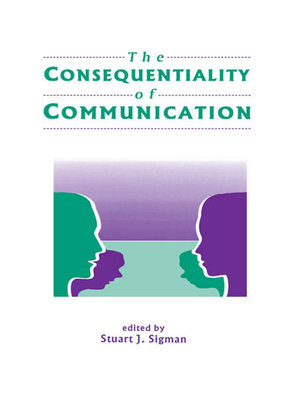
Sign up to save your library
With an OverDrive account, you can save your favorite libraries for at-a-glance information about availability. Find out more about OverDrive accounts.
Find this title in Libby, the library reading app by OverDrive.



Search for a digital library with this title
Title found at these libraries:
| Library Name | Distance |
|---|---|
| Loading... |
In a bold attempt to redirect the ways theories of communication are conceived and research on communication processes are conducted, this volume questions prevailing communication scholarship that emphasizes the cultural, psychological, and sociological variables that impact on, and/or are impacted by, communication. Instead of focusing on the consequences of communication, this books urges readers to examine the consequentiality of communication — what it is about the communication process that enables it to play a defining role in our lives. Communication is not a neutral conveyor of meanings derived from culture, cognition, or social structure, and is not explained by correlations with external variables. Meaning emerges from the communication process itself; it is dependent upon what transpires during the real-time moments of communicators behaving with each other. To properly study this new paradigm, a new vocabulary for thinking about the consequentiality of communication is needed and proposed.
Four theoretical orientations are used to stake out this new territory: coordinated management of meaning, neo-rhetorical theory, conversation analysis, and social communication theory. While there are points of agreement and overlap on the need to study communication as inherently consequential, there are also differences across the four theories — in the value of "rules" as an explanatory concept, on the relationship between structure and process, and on the very constitution of a "theory." Thus, this book has the benefit of articulating a new paradigm for communication scholarship without losing sight of the discipline's rich diversity.







